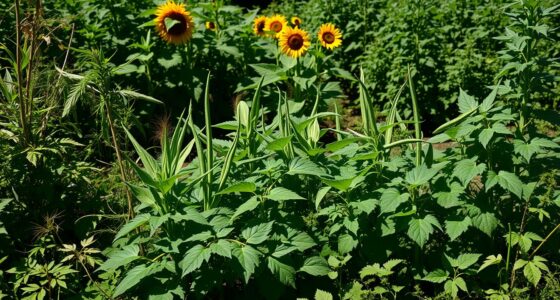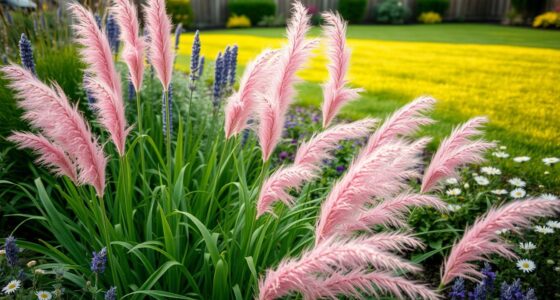To maximize your garden’s health and yield, plant onions and garlic alongside crops like carrots, lettuce, and cabbage, which benefit from their pest-repelling properties. These alliums mask scents and release sulfur compounds that deter pests while boosting flavor in nearby plants. Keep these companions well-spaced for airflow and rotate crops annually to prevent issues. Continuing with these strategies will help you create a resilient, productive garden ecosystem.
Key Takeaways
- Onions and garlic naturally repel pests like aphids, carrot flies, and beetles, protecting nearby crops.
- Pair with carrots, lettuce, and cabbage to enhance growth, flavor, and pest resistance.
- Maintain proper spacing (4-6 inches) and rotate crops annually to prevent disease and soil depletion.
- Use their sulfur compounds to mask plant scents and deter pests, reducing the need for chemical treatments.
- Incorporate nitrogen-fixing plants and practice crop rotation for healthier soil and higher yields.
Benefits of Companion Planting With Onions and Garlic
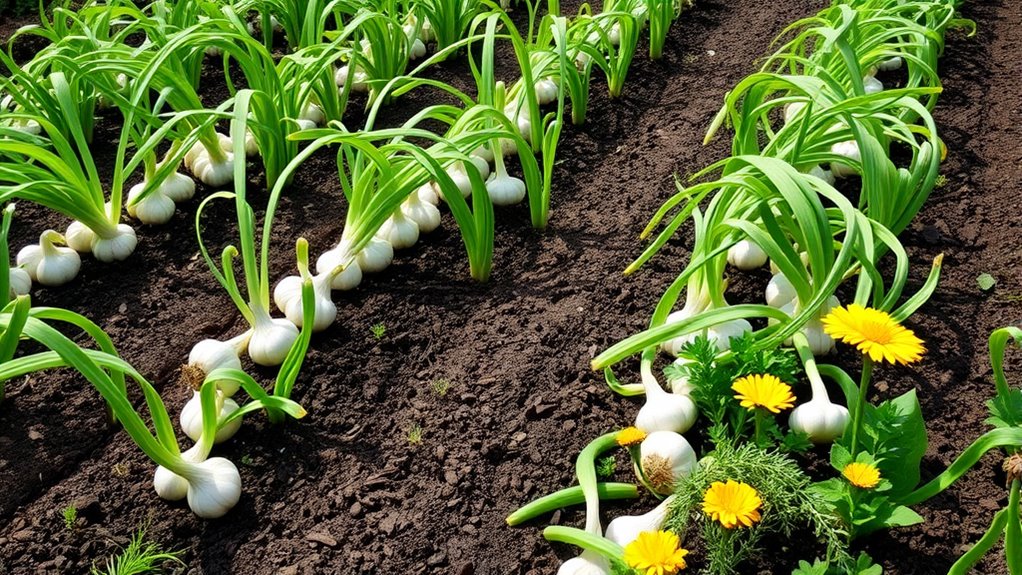
Companion planting with onions and garlic offers numerous benefits that can enhance your garden’s health and productivity. When you plant these bulbs alongside other vegetables, you naturally repel pests like aphids, carrots flies, and beetles, reducing the need for chemical treatments. Their strong smell also masks the scent of nearby crops, making it harder for pests to locate their preferred hosts. Additionally, onions and garlic improve soil health by suppressing fungal diseases and enriching microbial activity. They can also act as natural deterrents for rodents and larger pests, protecting your garden beds. By integrating onions and garlic, you create a more balanced ecosystem, encouraging beneficial insects and supporting overall plant vigor. This simple method boosts your garden’s resilience and yields without extra effort or chemicals. Moreover, understanding the 16PF personality traits involved in plant compatibility can help you optimize your planting strategies for better results. Soil health benefits further contribute to the long-term sustainability of your garden. Incorporating companion planting principles with these bulbs can also lead to better nutrient cycling and plant synergy, promoting a healthier garden environment.
Best Crops to Pair With Onions and Garlic
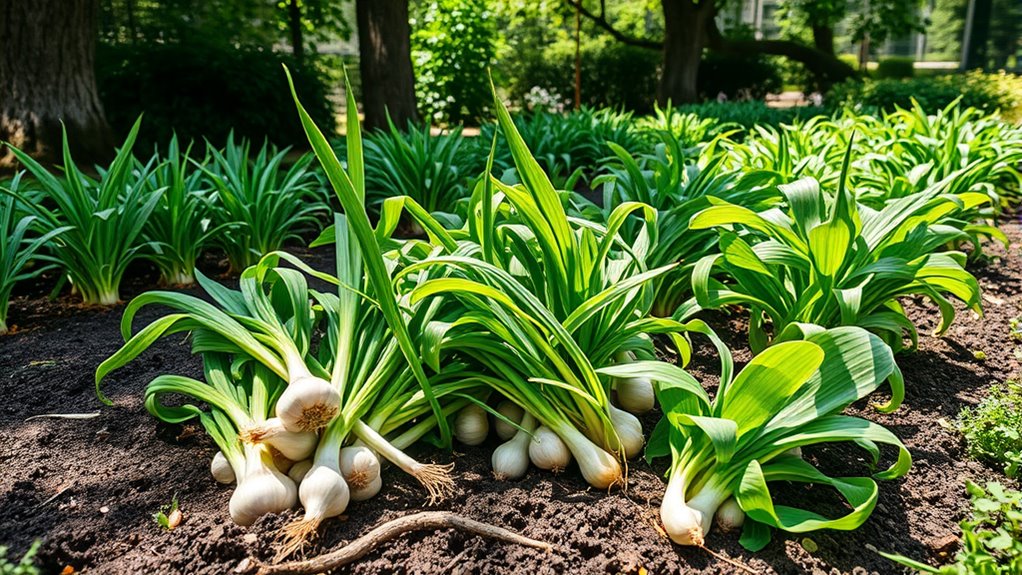
Onions and garlic thrive when planted alongside crops that benefit from their pest-repelling properties and contribute to soil health. These plants can enhance your garden’s overall productivity and protect neighboring crops. Here are the best crops to pair with onions and garlic:
Plant onions and garlic to boost soil health and naturally repel pests in your garden.
- Carrots – Their roots grow underground, and onions help repel pests that target carrots, leading to healthier produce.
- Lettuce – It benefits from the pest control onions provide and benefits from improved soil conditions.
- Cabbage – Garlic and onions help deter cabbage worms, reducing the need for chemical interventions.
Additionally, color accuracy in projectors can influence how well plant colors are represented, which is useful for garden planning and monitoring plant health. Proper crop rotation practices involving onions and garlic can further improve soil fertility and prevent disease buildup.
Plants That Benefit From Onion and Garlic Neighbors
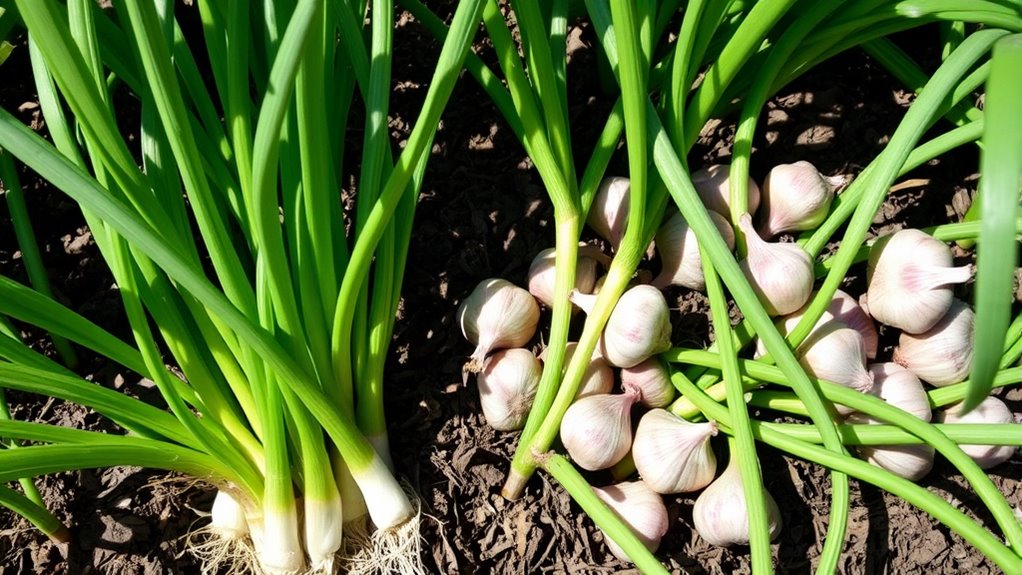
Planting onions and garlic nearby can help boost pest resistance for your garden. They also enhance the flavor profiles of certain crops and support healthy growth overall. By choosing the right neighbors, you can create a more resilient and flavorful garden. Additionally, integrating space-saving and organization strategies can make your gardening area more efficient and manageable. Using companion planting techniques can further improve nutrient uptake and reduce the need for chemical pesticides, creating a healthier environment for your plants. Incorporating effective tools like specialized spray tips and strainers can ensure optimal growth conditions and pest control.
Boosts Pest Resistance
When garlic and onions are planted nearby, they can considerably enhance the pest resistance of certain crops. Their strong smell helps repel common pests, reducing the need for chemical treatments. This natural defense benefits plants like carrots, lettuce, and spinach, which are often targeted by pests. By acting as a pest barrier, garlic and onions create a protective zone that keeps harmful insects at bay. Additionally, incorporating expert advice can improve your pest management strategies and promote healthier gardens.
Here are three ways they boost pest resistance:
- Mask plant scents, confusing pests and preventing infestations.
- Release sulfur compounds harmful to pests but safe for beneficial insects.
- Deter pests like aphids, carrot flies, and beetles from attacking neighboring plants.
Enhances Flavor Profiles
In addition to their pest-repelling properties, onions and garlic can considerably enhance the flavor of nearby crops. When planted close to certain vegetables, they can intensify their natural taste, making your harvest more flavorful. For example, herbs like parsley and basil develop richer aromas, while carrots and lettuce gain a sharper, more vibrant taste. This flavor boost results from the subtle chemical interactions that occur between the plants. To help visualize, here’s a quick guide:
| Beneficial Plants | Flavor Enhancement | Notes |
|---|---|---|
| Carrots | Sweetness & Depth | Enhances natural sweetness |
| Lettuce | Crisp & Mild | Adds a fresh, subtle kick |
| Parsley | Aromatic & Bright | Intensifies aroma |
| Basil | Rich & Peppery | Boosts flavor complexity |
Planting onions and garlic nearby elevates the flavor profile of your garden’s bounty. Additionally, understanding the chemical interactions between these plants can help optimize your planting strategy for maximum flavor enhancement, which is a key aspect of companion planting that benefits both taste and plant health. Recognizing the beneficial effects of onion and garlic neighbors can also improve overall garden productivity by naturally deterring pests and reducing the need for chemical interventions.
Supports Healthy Growth
Onions and garlic don’t just improve flavor; they also promote healthier growth in certain nearby plants. Their natural properties help create a pest-resistant environment and improve soil health, which benefits your garden. When planted alongside others, they can enhance growth by repelling harmful insects and fungi.
Consider these plants that thrive with onion and garlic neighbors:
- Carrots – Garlic and onions repel carrot flies, reducing damage.
- Lettuce – They deter aphids, promoting lush, healthy leaves.
- Cabbage – Their pest-repelling qualities support vigorous growth and reduce disease risks.
Crops to Avoid Planting Near Onions and Garlic
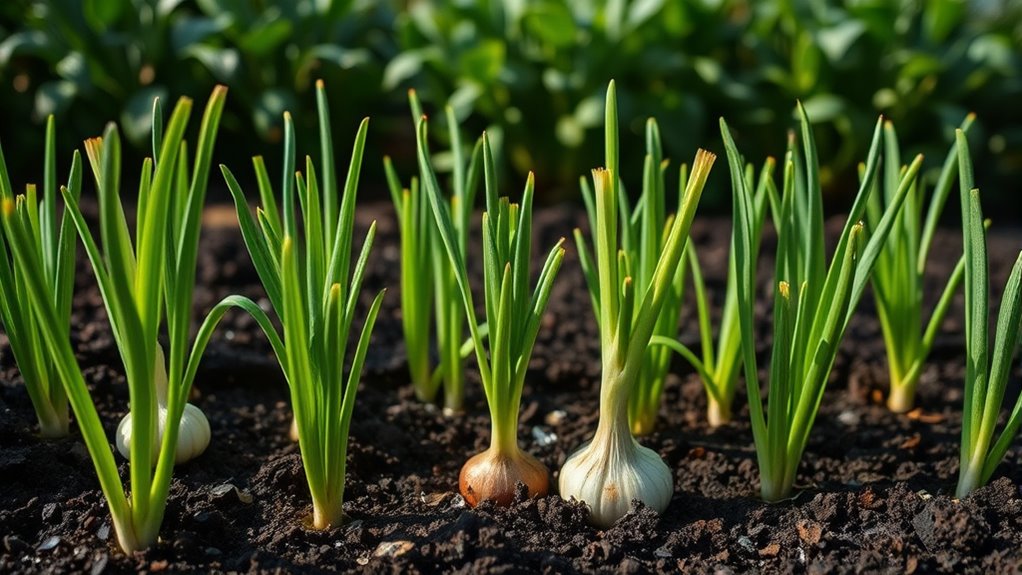
Certain crops can hinder the growth of onions and garlic, so it’s best to avoid planting them nearby. These plants may compete for nutrients or spread diseases. For example, legumes can cause onion bulbs to rot, while brassicas may introduce pests that target all alliums. Root crops like carrots or parsnips might obstruct bulb development. To help you identify problematic neighbors, here’s a quick reference:
| Crop Type | Why to Avoid | Alternative Planting Tips |
|---|---|---|
| Legumes | Cause fungal issues | Plant with cabbage or lettuce |
| Brassicas | Attract pests harmful to onions | Pair with herbs like dill or basil |
| Root Crops | Compete for soil nutrients | Grow alongside strawberries or spinach |
Additionally, understanding self watering plant pots can help ensure healthy growth for your desired crops.
Tips for Successful Companion Planting Strategies
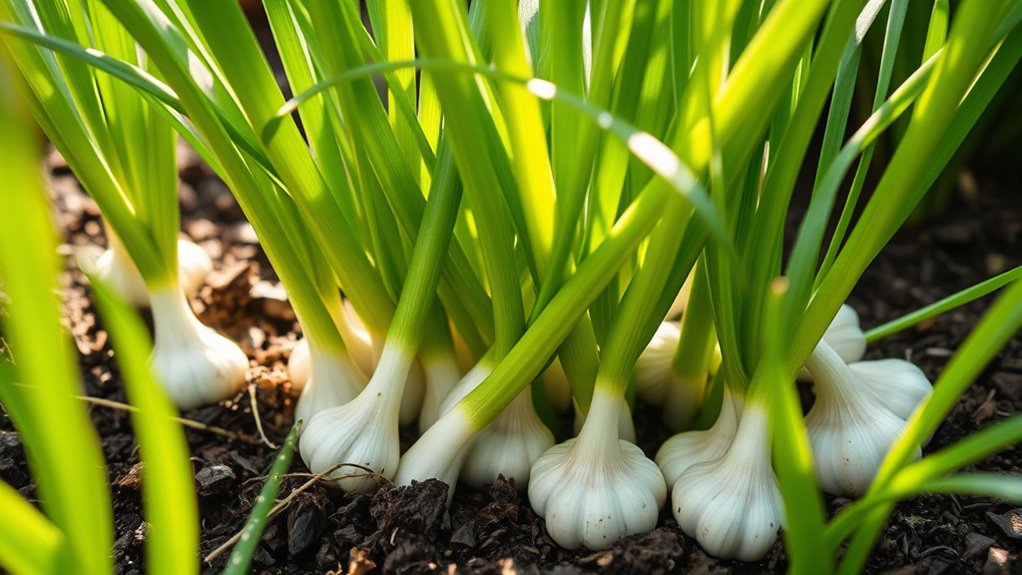
To succeed with companion planting, you need to carefully optimize where you place your crops for maximum benefit. Managing pests effectively and keeping soil healthy are also vital steps. By focusing on these strategies, you’ll create a thriving garden that supports your onions and garlic. Incorporating crop-specific considerations can further enhance your planting success. For example, understanding the cultural and regional breakfast traditions can inspire creative ways to diversify your garden’s companion plants. Additionally, understanding vetted product reviews can help you select high-quality tools and supplies to improve your gardening experience. Maintaining soil health through crop rotation and organic amendments is essential for sustained productivity. Implementing advanced pest prevention tools can provide an extra layer of protection for your crops.
Optimize Plant Placement
Strategic placement of onion and garlic plants can considerably boost their growth and pest resistance. To maximize benefits, consider these key tips.
- Plant onions and garlic near crops they protect, like carrots or lettuce, to deter pests naturally. Vetted pest-repellent properties of garlic and onions enhance garden health by reducing the need for chemical interventions. Proper placement takes advantage of their natural pest deterrent qualities, which are well-established in gardening practices.
- Space plants properly—about 4-6 inches apart—to ensure good airflow and prevent disease.
- Rotate their locations each season to avoid soil depletion and reduce the risk of pests building resistance.
- Be aware that improper placement or failure to follow these practices can lead to unexpected plant issues, affecting your harvest.
Manage Pest Control
Wondering how to keep pests at bay naturally? Companion planting with onions and garlic is a smart strategy. Their strong scents repel many common pests, like aphids, carrot flies, and nematodes. To maximize protection, plant onions and garlic near vulnerable crops, such as carrots and lettuce. Regularly inspect your plants for signs of pests and remove any affected leaves promptly. Use organic methods like neem oil or insecticidal soap if infestations become severe, but focus on prevention through plant placement. Companion planting benefits from strategic placement of onions and garlic, creating a natural pest barrier, reducing the need for chemical treatments. Pest deterrent properties of onions and garlic are well-documented in gardening practices. Consistent monitoring and strategic planting help keep pests under control, promoting healthy growth and a thriving garden. Additionally, understanding AI’s role in agriculture can help optimize pest management strategies through data-driven insights. Implementing integrated pest management strategies can further improve pest control effectiveness while maintaining organic practices.
Enhance Soil Health
Enhancing soil health is essential for successful companion planting because healthy soil provides the nutrients and structure your plants need to thrive. When you focus on soil health, you create a strong foundation for onions and garlic to grow vigorously and resist pests. To improve your soil, consider these strategies:
- Rotate Crops – Avoid planting onions or garlic in the same spot each year to prevent nutrient depletion and disease buildup.
- Add Organic Matter – Incorporate compost or well-rotted manure to boost soil fertility and improve drainage.
- Maintain Proper pH – Keep soil slightly acidic to neutral (pH 6.0-7.0), ensuring nutrients are accessible for your plants.
Healthy soil leads to healthier plants and more successful companion planting.
How Onions and Garlic Help in Pest Management
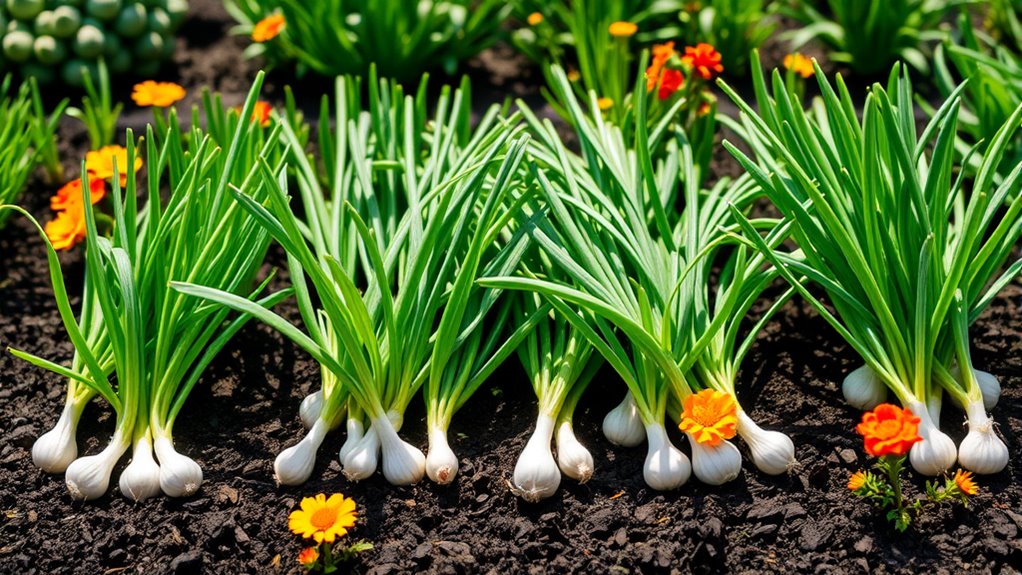
Onions and garlic are powerful natural pest repellents that can considerably reduce infestations in your garden. Their strong odors deter many common pests, including aphids, beetles, and spider mites. By planting these bulbs near vulnerable crops, you create a barrier that pests avoid. Their sulfur compounds release fumes that confuse insects and mask plant scents, making it harder for pests to find their targets. Use the table below to see specific pests and how onions and garlic help repel them:
| Pest | Effect of Onions & Garlic | Targeted Crops |
|---|---|---|
| Aphids | Repels by overwhelming scent | Lettuce, tomatoes |
| Spider Mites | Deters through sulfur compounds | Beans, peppers |
| Carrot Flies | Confuses with strong aroma | Carrots, parsnips |
| Onion Maggots | Acts as a natural repellent | Onions, shallots |
| Beetles | Deters with pungent smell | Brassicas, cabbage |
Maximizing Growth and Yield With Companion Planting Techniques
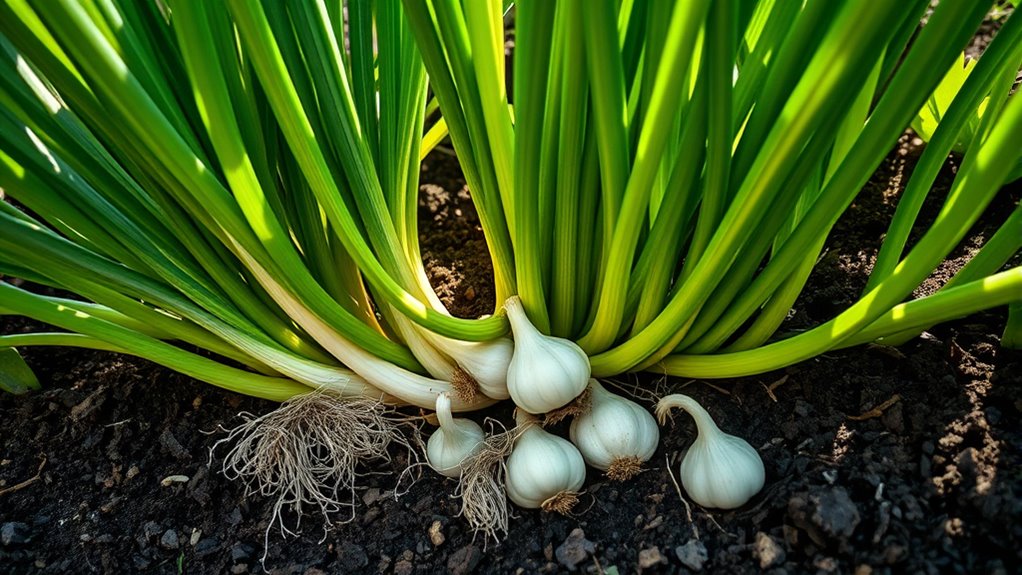
Maximizing your garden’s growth and yield relies on strategic companion planting techniques that optimize space, improve plant health, and boost productivity. To do this effectively, focus on planting onions and garlic alongside compatible crops that enhance growth.
Strategic companion planting boosts garden health, space efficiency, and yields through smart crop combinations and rotation.
Here are three key strategies:
- Pair with nitrogen-fixing plants like beans to enrich soil, supporting healthy onion and garlic development.
- Use spacing wisely to prevent overcrowding, ensuring each plant receives sufficient light and airflow.
- Rotate crops annually to minimize soil depletion and reduce pest buildup, maintaining long-term productivity.
Implementing these techniques helps create a balanced ecosystem, resulting in healthier plants and higher yields. Your garden benefits from smarter planting choices that maximize space and promote sustainable growth.
Frequently Asked Questions
Can Onions and Garlic Be Grown Together in the Same Bed?
You can definitely grow onions and garlic together in the same bed. Both plants thrive with similar soil and sunlight needs, making them compatible companions. Plant them close enough to share nutrients without overcrowding. Doing so can help you save space and simplify care. Just guarantee good drainage and avoid overcrowding to prevent diseases. Overall, growing onions and garlic side by side works well for a healthy, productive garden.
Are There Specific Soil Requirements for Onion and Garlic Companion Planting?
You want to know if there are specific soil requirements for growing onions and garlic together. Both prefer well-drained, loose soil rich in organic matter. make certain the soil is slightly acidic to neutral, with a pH around 6.0 to 7.0. Avoid heavy clay or overly sandy soils. Before planting, amend the soil with compost to improve fertility and drainage, giving your onions and garlic the best chance to thrive.
How Do I Rotate Onion and Garlic Crops Annually?
Think of your garden as a rotating dance floor. Each year, move your onions and garlic to a different spot, like changing partners to keep pests and diseases at bay. Avoid planting them in the same soil where you grew them before, and rotate with unrelated crops. This keeps your soil healthy and your plants thriving, ensuring a vibrant, pest-free harvest season after season.
Can Companion Planting Reduce the Need for Chemical Pesticides?
Companion planting can definitely help reduce your need for chemical pesticides. By planting certain companions, you attract beneficial insects that prey on pests, or you create natural barriers that deter harmful bugs. For example, planting marigolds near your vegetables can repel nematodes and aphids. You actively foster a healthier garden ecosystem, which lowers pest problems and decreases your reliance on chemicals, making your garden more sustainable and safe.
What Are Common Mistakes to Avoid in Onion and Garlic Companion Planting?
Imagine you’re on a quest for a thriving garden; avoiding common mistakes is key. You might plant onions and garlic too close to legumes, which can stunt their growth, or forget to rotate crops yearly, risking disease buildup. Don’t ignore soil health or overestimate pest-repelling effects. Instead, research proper spacing, crop rotation, and compatible companions to boost your garden’s health and yield.
Conclusion
By choosing your plant partners wisely, you gently nurture a thriving garden where every crop can flourish quietly. When you pay attention to these subtle companions, you create a harmonious environment that encourages growth and resilience. Remember, sometimes it’s the quiet allies — like onions and garlic — that support your garden’s hidden strength. With patience and care, you’ll find your garden blossoming in ways that speak softly of abundance and balance.


